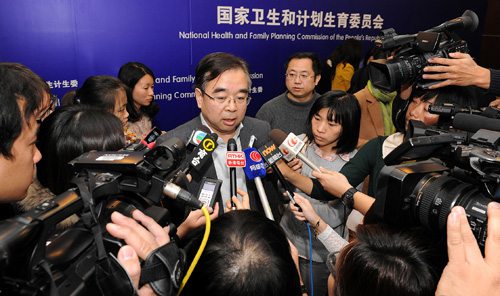|
 |
|
VETERAN SPEAKER: Mao Qun'an, spokesman for the National Health and Family Planning Commission, formerly known as the Ministry of Health, since 2003, answers questions from reporters after a news conference in Beijing on November 11 (HE JUNCHANG) |
In an effort to improve military transparency, the Chinese People's Liberation Army (PLA) and the Chinese People's Armed Police Force (CPAPF) appointed spokespersons for various services on November 20.
The eight official spokespersons were named by the Central Military Commission to represent the PLA's General Political, General Logistics and General Armament departments, as well as the PLA Navy, Air Force, Second Artillery Force and the CPAPF.
They are expected to release information on important activities organized by their respective services to the international community and to respond to both public concerns and questions from the media, according to a statement of the Central Military Commission.
Other major units within the military are also likely to appoint spokespersons in the future, which will help develop the spokesperson system further, the PLA Daily, flagship newspaper of China's military, reported on November 22.
Li Jie, a senior expert at the Naval Military Studies Research Institute of the PLA, said that a spokesperson system is a necessity for the Chinese armed forces. "It has the ability to improve military transparency and help gain more trust from the international community," he said.
The move came amid recent efforts by China to advance its spokesperson system.
On October 15, the State Council, China's cabinet, issued guidelines that require government agencies to enhance transparency by releasing information in a timely, comprehensive and accurate manner.
Cai Mingzhao, Minister of the State Council Information Office (SCIO), said at a media briefing on October 16 that the time has come to formulate and enforce detailed regulations for the spokesperson system, including entry tests for applicants.
Long process
In 1983, the Ministry of Foreign Affairs officially launched a spokesperson system, the first of its kind in China, opening up an information channel to the public. Meanwhile, a small number of spokespersons for other ministries were also introduced to the media that year.
In the following 20 years, however, those spokespersons only appeared at diplomatic or important political events, as most government departments lacked a regular system for releasing news.
In 2003, the sudden outbreak of the Severe Acute Respiratory Syndrome (SARS) and its aftermath made Chinese leaders realize the importance of releasing information on government affairs and increasing administrative transparency, a task that requires a comprehensive news release system with professionally trained spokespersons.
Mao Qun'an experienced the dramatic change of China's spokesperson system in 2003 as the first emergency spokesman appointed by the then Ministry of Health, now the National Health and Family Planning Commission.
During the early stages of the SARS outbreak, which claimed 349 lives on the Chinese mainland and left many survivors with lifelong ailments, health authorities came under fire for the slow release of information and a lack of transparency. The criticism led to Mao quickly being appointed as spokesman. From April to June 2003, the Ministry of Health issued the latest information about the pandemic at 4 p.m. every day.
"The SARS outbreak prompted the Chinese Government to adopt a more open attitude toward media coverage of major crises and emergencies," Mao said.
After the crisis, China initiated a special training program for spokespersons. The first intake in September of that year involved 100 spokespersons from 66 central government departments, with the second one in November trained another 80 from provincial-level governments. During the following decade, the program was expanded to include more spokespersons at the local level.
In 2004, a list of 75 spokespersons from 62 departments of the State Council was released to the public, along with phone numbers for their relevant government offices.
The Ministry of National Defense established its Information Office in 2008 to provide information on the country's national defense and military affairs to the domestic and international media.
In June 2010, 11 Party departments, including the CPC Central Commission for Discipline Inspection, also established a spokesperson system.
According to official statistics, over the past 10 years, more than 540 officials were appointed as spokespersons for central- and provincial-level governments.
In October, the State Council announced that its Information Office is to organize regular media briefings to address public concerns over important policies and pressing issues. Heads of central government departments tasked with overseeing macroeconomic development and people's livelihoods are required to attend media briefings at least once a year, while departmental spokespersons must attend briefings once every quarter, as stipulated by the State Council guidelines.
| 